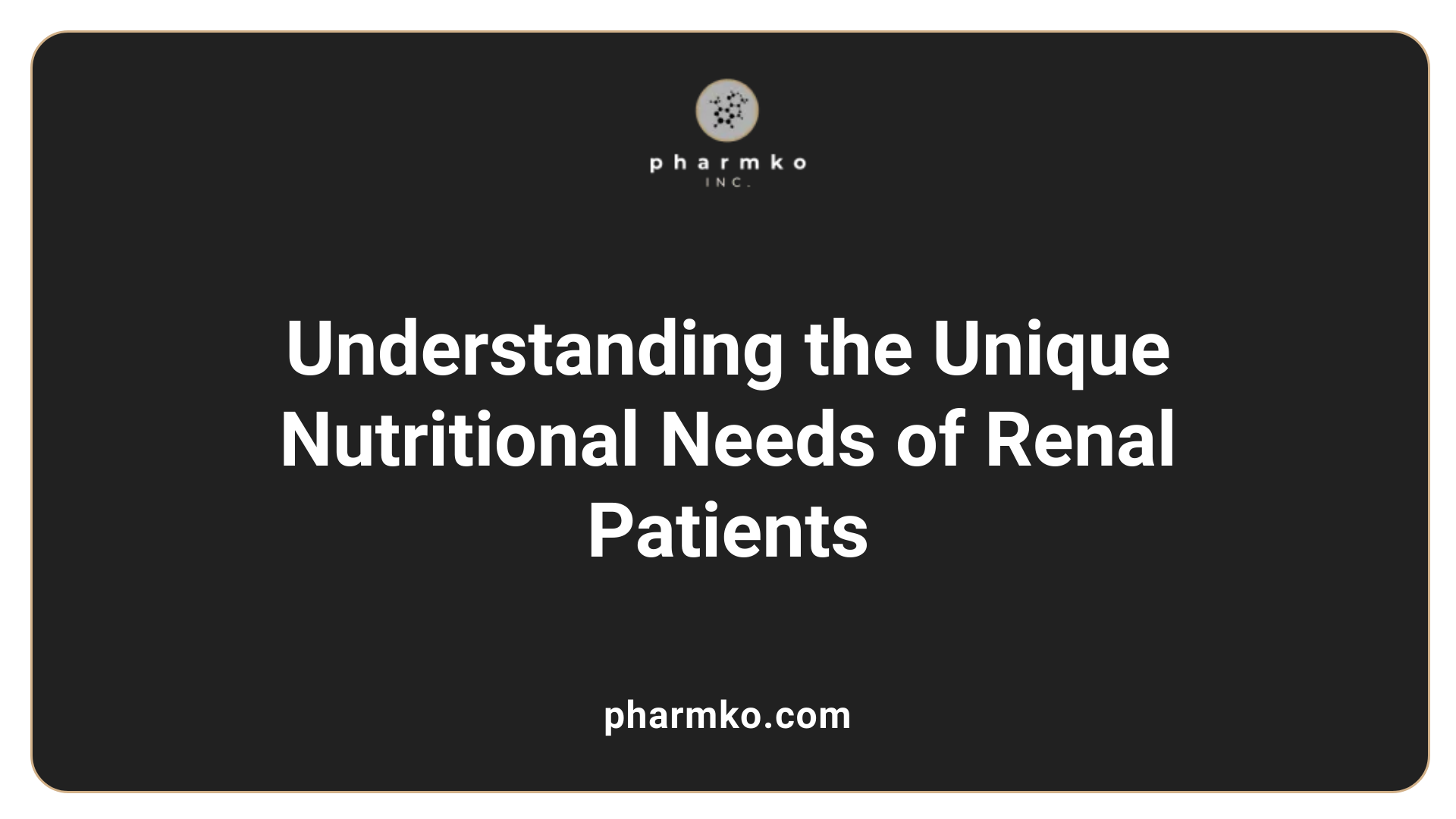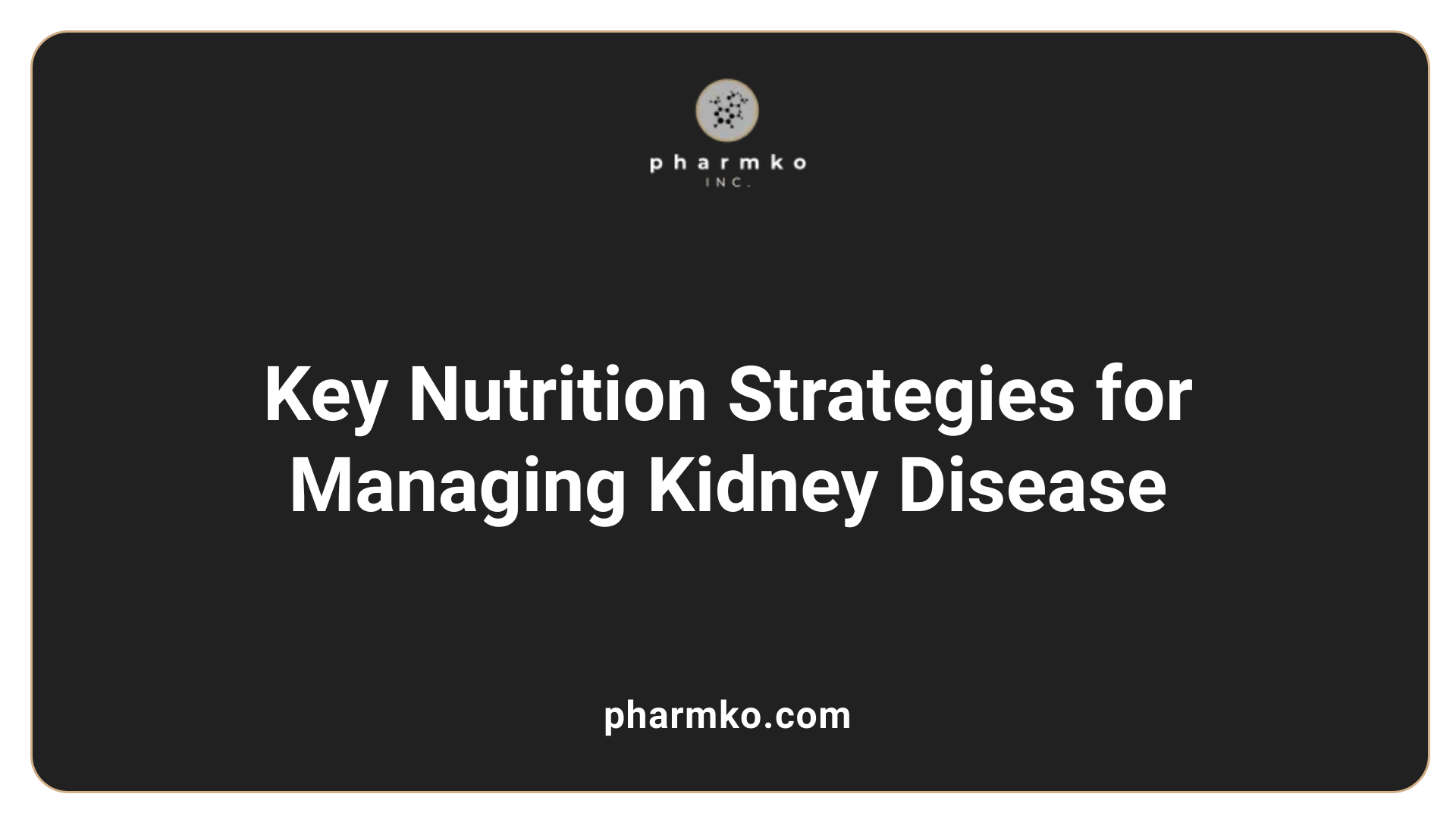Comprehensive renal nutrition options
Understanding Renal Nutrition
Managing kidney disease through diet involves a comprehensive understanding of nutritional needs specific to renal patients. By focusing on the right nutrients, restricting key minerals, and adjusting dietary habits, individuals with chronic kidney disease (CKD) can maintain kidney function and improve their quality of life. This article delves into renal nutrition, providing essential dietary insights and effective strategies to support kidney health.
Nutritional Requirements for Renal Patients

What are the nutritional requirements for renal patients?
Renal patients have unique nutritional requirements essential for supporting kidney function and slowing disease progression. Their dietary focus includes the following:
-
Sodium Restriction: Sodium intake must be limited to prevent issues like high blood pressure, edema, and increased thirst. A typical guideline is to keep sodium consumption under 2,300 mg per day . Patients are encouraged to choose fresh foods over processed items and enhance flavor with herbs instead of salt.
-
Phosphorus and Potassium Management: Because impaired kidneys struggle to clear excess phosphorus and potassium, both minerals should be monitored closely.
- Phosphorus: A low-phosphorus diet is generally recommended, targeting 800 to 1,200 mg daily to preserve bone health. High-phosphorus foods such as certain dairy products and meats should be managed.
- Potassium: Limiting potassium is crucial, as high levels can lead to serious heart complications. Daily intake may need to be confined to 1,500 to 2,500 mg . Foods like bananas and potatoes should be avoided or consumed in moderation.
-
Protein Intake Adjustments: Protein is vital but should be tailored according to kidney disease stages. High-quality protein sources, including fish, poultry, and egg whites, allow for necessary intake while reducing waste buildup.
-
Fluid Intake Moderation: Fluid management is essential, especially in later stages of chronic kidney disease (CKD), to prevent heart strain and swelling. Health professionals determine fluid limits based on individual urine output and health status.
Overall, consulting a nephrologist or renal dietitian is crucial for personalized dietary recommendations tailored to the patient’s health needs.
Permitted Foods and Cooking Tips on a Renal Diet

What foods are allowed on a renal diet?
A renal diet emphasizes whole, unprocessed foods that are low in sodium, potassium, and phosphorus. Here are some recommended food types:
-
Proteins:
- Eggs
- Fish (like sea bass)
- Skinless chicken or turkey
- Tofu and beans
- Lean cuts of beef
-
Fruits:
- Lower-potassium options like apples, blueberries, strawberries, and cranberries are favored.
-
Vegetables:
- Choose low-potassium vegetables such as red bell peppers, cauliflower, and cucumbers.
-
Grains:
- Barley, buckwheat, and unsalted popcorn are excellent whole grain choices.
-
Fats:
- Healthy oils, like olive oil, can be used in moderation.
Cooking methods for reducing sodium
Adjusting cooking methods can significantly enhance the safety and taste of meals on a renal diet. Here are some effective strategies:
-
Use Fresh Ingredients:
Fresh meats and vegetables are ideal, as they are often lower in sodium compared to processed foods. -
Season with Herbs:
Replace salt with fresh herbs and spices to add flavor without the sodium. -
Soaking Vegetables:
Soak high-potassium vegetables in water before cooking to reduce potassium content. -
Opt for Low-Sodium Options:
When shopping, choose low-sodium or no-salt-added products to keep sodium levels in check.
Employing these food choices and cooking techniques can help maintain kidney health and prevent further damage.
Nutrition Interventions for Managing Kidney Disease

What are the nutrition interventions for kidney disease?
Nutrition interventions for kidney disease, particularly for those living with chronic kidney disease (CKD), center around tailored dietary modifications. Key strategies include:
- Limiting fluid intake : Monitoring fluid consumption is essential to prevent complications such as swelling and high blood pressure.
- Reducing protein consumption : It's important to adjust protein intake as damaged kidneys struggle to filter protein waste. Depending on the stage of CKD, the protein needs of patients may vary.
- Managing sodium intake : Keeping sodium levels low can help reduce thirst and fluid retention. Recommendations often suggest limiting sodium to less than 2,300 mg per day.
- Controlling potassium levels : High potassium can lead to severe heart issues, so patients are encouraged to limit potassium intake and focus on low-potassium food options.
- Restricting phosphorus : Excess phosphorus can contribute to weakened bones and cardiovascular complications. A daily intake target of 800 to 1,200 mg is recommended, tailored to individual needs.
For dialysis patients, higher protein intake is typically necessary (around 8-10 ounces of high-protein foods daily) to help counteract waste buildup from the treatment. It is highly recommended that individuals engage with a renal dietitian specializing in kidney nutrition to develop a personalized eating plan, allowing better management of their specific medical needs. As kidney function declines, these dietary adjustments become crucial to maintaining overall health and preventing disease complications.
Why the DASH Diet is Beneficial for Renal Patients

DASH Diet Principles
The DASH Diet, or Dietary Approaches to Stop Hypertension, is designed not just for lowering blood pressure but also promoting overall health. This diet emphasizes:
- Fruits and Vegetables : Provides essential vitamins and minerals.
- Whole Grains : Rich in fiber, aiding digestion and heart health.
- Low-Fat Dairy : Offers calcium without excessive fat.
- Lean Proteins : Sources like fish and poultry help meet protein needs without overwhelming the kidneys.
Notably, the DASH Diet restricts sodium intake to help manage fluid retention and blood pressure, two crucial aspects for individuals with kidney issues.
Suitability for Kidney Health
The dietary structure of the DASH diet aligns well with managing chronic kidney disease (CKD). By focusing on low-sodium, low-saturated fat, and low-added sugar options, it minimizes the risk of complications arising from hypertension and other related conditions.
However, it's essential for renal patients, particularly those on dialysis, to consult health professionals before adopting the DASH Diet. Individual dietary restrictions related to potassium and phosphorus levels need careful consideration. Therefore, personalized adjustments are crucial to ensure sufficient nutrient intake while protecting kidney function.
This tailored approach aids in maintaining a balanced intake of fiber, potassium, and other necessary minerals, thus playing a significant role in kidney health management.
The Role of Renal Dietitians

Personalized Meal Planning
Renal dietitians play a crucial role in managing nutritional needs for individuals with chronic kidney disease (CKD). They provide personalized meal plans that take into account the specific health status, preferences, and dietary restrictions of each patient. By assessing kidney function and other health concerns, dietitians can tailor diets to ensure an optimal balance of protein, sodium, potassium, and phosphorus. This customization helps to minimize stress on the kidneys while meeting caloric needs and preventing malnutrition.
Consultation Importance
Consulting a renal dietitian is vital for anyone managing kidney disease. These experts help educate patients about their dietary choices, including how to read food labels and understand nutrient content. Furthermore, they guide patients on how to incorporate heart-healthy foods while restricting harmful ingredients. Engaging with a renal dietitian ensures that dietary practices support overall health and slow the progression of kidney disease. For those looking to find specialized dietary support, a simple search for "Find a renal dietitian" can lead to valuable resources and qualified professionals.
Adjusting Lifestyle for Renal Health
Incorporating Suitable Foods
Eating a renal-friendly diet starts with incorporating suitable foods that are low in sodium, potassium, and phosphorus. Beneficial options include:
- Red bell peppers : These are low in potassium and high in essential vitamins.
- Blueberries and cranberries : These fruits provide antioxidants and promote urinary tract health.
- Egg whites : They offer high-quality protein without excessive phosphorus.
- Garlic and onions : Both add flavor without salt and have health benefits.
Avoiding Harmful Foods
To protect kidney health, it's crucial to avoid harmful foods rich in sodium, potassium, and phosphorus:
- High-sodium foods : Canned soups, deli meats, and processed snacks can lead to increased thirst and fluid retention.
- High-potassium foods : Bananas, oranges, and avocados can cause heart issues if not monitored.
- Dairy products : Many contain high levels of phosphorus, impacting bone health.
Importance of Monitoring Nutrient Intake
Monitoring nutrient intake is vital in a renal diet. Regular consultations with a renal dietitian help tailor nutritional plans that fit individual needs, focusing on balanced amounts of proteins, carbohydrates, and fats. Engaging in this comprehensive dietary approach can contribute significantly to managing kidney disease effectively.
Towards Better Kidney Health
Embracing a comprehensive approach to renal nutrition is key for managing kidney disease. By adhering to a renal diet tailored to individual needs, patients can protect kidney function, limit complications, and improve their overall wellbeing. Working closely with renal dietitians and staying informed about the latest dietary strategies can empower patients to make proactive choices in support of their kidney health.
References
- Renal Diet - NephCure
- Eating Right for Chronic Kidney Disease - NIDDK
- Kidney-friendly eating plan
- The Renal Diet: Best Foods for Kidney Health
- Renal Diet & Nutrition - Alport Syndrome Foundation
- NKF Nutrition Coach | National Kidney Foundation
- The Renal Diet - 15 Foods That Are Good For Your Kidneys | DaVita
- What to Eat on a Renal Diet | UPMC HealthBeat
- The DASH Diet - National Kidney Foundation













